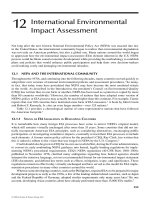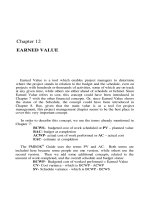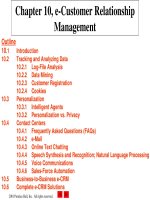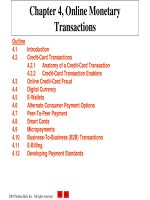Lecture E-commerce and e-business for managers - Chapter 12: Globalization
Bạn đang xem bản rút gọn của tài liệu. Xem và tải ngay bản đầy đủ của tài liệu tại đây (962.39 KB, 36 trang )
Chapter 12, Globalization
Outline
12.1
Introduction
12.2
Regulating the Internet on an International Level
12.2.1 Accounting for Legal and Cultural Differences
12.2.2 International Internet Regulations
12.3
Creating an eBusiness with International Capabilities
12.3.1 Choosing an International Market
12.3.2 Obtaining a Local Internet Address
12.3.3 Internationalization and Localization
12.3.4 Partnering and Hiring
12.3.5 Payment Systems
12.3.6 Distribution
12.3.7 Legal and Taxation Systems
12.3.8 Promotions
12.4
Canada
12.5
Mexico, Central and South America
12.6
Europe
2001 Prentice Hall, Inc. All rights reserved.
Chapter 12, Globalization
Outline
12.7
12.8
12.9
12.10
12.11
Africa
Middle East
Asia
Australia
Future of Global eBusiness
2001 Prentice Hall, Inc. All rights reserved.
12.1 Introduction
• Faster international communication speeds
• Unprecedented ability to conduct business
globally
• Larger customer bases
• International laws
• Cultural differences
2001 Prentice Hall, Inc. All rights reserved.
12.2 Regulating the Internet on a
National Level
• Poses challenges to a world composed of different
cultures, attitudes, languages, codes of conduct
and government authorities
• Users can be exposed to products, services or
information that are considered offensive or that
are illegal in their countries of residence
• Application of national laws to cyberspace
2001 Prentice Hall, Inc. All rights reserved.
12.2.1 Accounting for Legal and
Cultural Differences
• Government regulation
– Affects the growth of the Internet
– Has the potential to cause major problems as the volume of
international ebusiness transactions increases
• International organizations must decide when
national governments can apply or create laws that
will affect parties and transactions that fall
partially or completely outside their jurisdiction
2001 Prentice Hall, Inc. All rights reserved.
12.2.2 International Internet
Regulations
• Businesses and legal experts are calling for the
creation of worldwide ecommerce laws and
standards
• Address cybercrimes such as copyright
infringement, cybersquatting, cyber terrorism,
fraud, hacking and computer viruses
• World Intellectual Property Organization (WIPO)
– A United Nations’ organization that created an international
forum for regulating Internet issues
• The Organization for Economic Cooperation and Develo
– A forum for 29 member countries to communicate ideas,
share experiences and develop policy
2001 Prentice Hall, Inc. All rights reserved.
12.2.2 International Internet
Regulations
• European Union Directive on Data Protection
– An agreement among its members on the regulations that
apply to information exchange
– Mandates that personal information be kept current and used
in a lawful manner for its designated purpose
• Extensive international regulation may conflict
with national laws and impede the growth of e
business
2001 Prentice Hall, Inc. All rights reserved.
12.2.2 International Internet
Regulations
• Internet Content Summit (2000)
– “Selfregulation of Internet Content”
– Report favors selfrating and filtering over thirdparty
regulation
– Suggests that Web content providers rate their sites, that
filters for possibly offensive content be made available and
that a network of national hotlines be established so that
Internet users can register complaints about site content
2001 Prentice Hall, Inc. All rights reserved.
12.3 Creating an eBusiness with
Global Capabilities
• Opportunity for expansion
• An ambitious and expensive investment that does
not guarantee increased revenue
• Potential global businesses must review expected
revenues vs. expected cost
• Linguistic and cultural barriers
2001 Prentice Hall, Inc. All rights reserved.
12.3.1 Choosing an International
Market
• Focus time and money in one or two key markets
initially
• Research competitors and visitors in foreign
markets
• When choosing an international market consider:
–
–
–
–
The number of people online
Internet usage growth rates
Per capita income
The consumers’ expectations of your business
2001 Prentice Hall, Inc. All rights reserved.
12.3.1 Choosing an International
Market
Type of information found at Global Reach’s
Web site. (Courtesy of Global Reach.)
2001 Prentice Hall, Inc. All rights reserved.
12.3.2 Obtaining a Local Internet
Address
• .com domain name is the most universally
recognized address on the Web
• Domainname registration in foreign countries is
often complex
• May require owning a trademark or incorporating
your business in the foreign country
• Organizations offering domain name registration
services:
– Internet Assigned Numbers Authority (IANA)
– NetNames
2001 Prentice Hall, Inc. All rights reserved.
12.3.3 Internationalization and
Localization
• Internationalization
– Restructuring the software used by your ebusiness so that it
can process foreign languages, currencies, date formats and
other variations involved in conducting business globally
• Localization
– Includes the translation and cultural adaptation of your site’s
content and presentation
• Online translation services
–
–
–
–
Enterprise Translation Server
Alis Technologies
Logos
AltaVista’s Babelfish
2001 Prentice Hall, Inc. All rights reserved.
12.3.3 Internationalization and
Localization
• Online translators are not 100 percent reliable
• Consider the context of the message in a foreign
culture
• Translate META tags and text within graphic
images
• Adaptation of site layout to accommodate
translations
• Color scheme and logo translation
• Conversion rates
2001 Prentice Hall, Inc. All rights reserved.
12.3.3 Internationalization and
Localization
• Consider downloading capabilities in foreign
markets
• Global content
– Refers to information and design that requires translation,
but is essentially the same for all cultures
• Regional content
– Product and marketing information that is usually written
once in English and then adapted for various markets
• Local content
– Material on specific regional pages that appears only on that
Web site, such as regional promotions, pricing, delivery and
store or office locations
2001 Prentice Hall, Inc. All rights reserved.
12.3.3 Internationalization and
Localization
eBay’s Chinatown site uses a red background signifying celebrationand good
luck. (These materials have been reproduced with the permission of eBay Inc.
COPYRIGHT EBAY INC. All Rights Reserved.
2001 Prentice Hall, Inc. All rights reserved.
12.3.3 Internationalization and
Localization
Logos Dictionary query page with sample query. (Courtesy of Logos
Group, Italy.)
2001 Prentice Hall, Inc. All rights reserved.
12.3.3 Internationalization and
Localization
Logos query results page with sample query result. (Courtesy of Logos
Group, Italy.)
2001 Prentice Hall, Inc. All rights reserved.
12.3.3 Internationalization and
Localization
Aquarius.net translator search. (Courtesy of
Language Networks, BV.)
2001 Prentice Hall, Inc. All rights reserved.
12.3.3 Internationalization and
Localization
Various America Online icons. (AOL screenshots copyright © 2000 America
Online Inc. Used with permission.)
2001 Prentice Hall, Inc. All rights reserved.
12.3.3 Internationalization and
Localization
First Tuesday provides jobs in the European Information
Technology market. (Courtesy of First Tuesday, LTD.)
2001 Prentice Hall, Inc. All rights reserved.
12.3.4 Partnering and Hiring
• Choosing a local partner in a foreign market offers
several benefits
–
–
–
–
Physical presence in the target country
A recognized brand
Extensive knowledge of the target market
Localized content and customer service
2001 Prentice Hall, Inc. All rights reserved.
12.3.5 Payment Systems
• Offer alternatives to creditcard payment
– In many countries, credit cards are far less common than in
the United States
– In Europe, cashondelivery is a common form of payment
• Giros
– Wire transfers between bank accounts
• Direct Debit
– ePayment service from an American company called
EuroDebit
– Enables electronic debits from European customers’ bank
accounts to be sent to merchants’ bank accounts for a small
fee
2001 Prentice Hall, Inc. All rights reserved.
12.3.6 Distribution
• Shipping from a local distribution center
• National postal services
– British Post Office
– Deutsche Post
• International shipping and handling companies
– UPS
– Federal Express
– The United States Postal Service
• Businesses must consider the additional time
needed for packages to pass through customs
2001 Prentice Hall, Inc. All rights reserved.
12.3.7 Legal and Taxation Systems
• Laws may vary by country, state or region
• Companies that wish to buy or sell products in the
global market must obey both the export laws of
their own country and the import laws of the
country in which they wish to do business
• Government restrictions on international trade
• International tax law resources
–
–
–
–
–
Taxware International, Inc.
myCustoms
World Tariff
Vastera
ClearCross
2001 Prentice Hall, Inc. All rights reserved.









